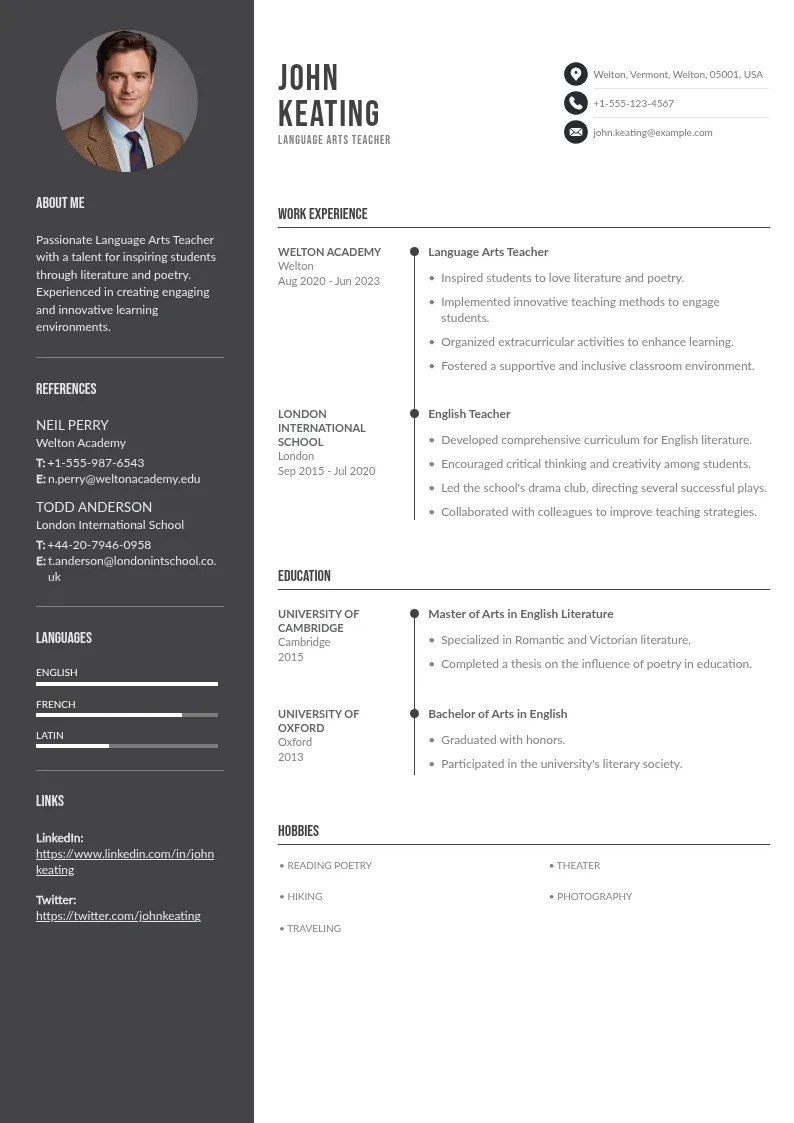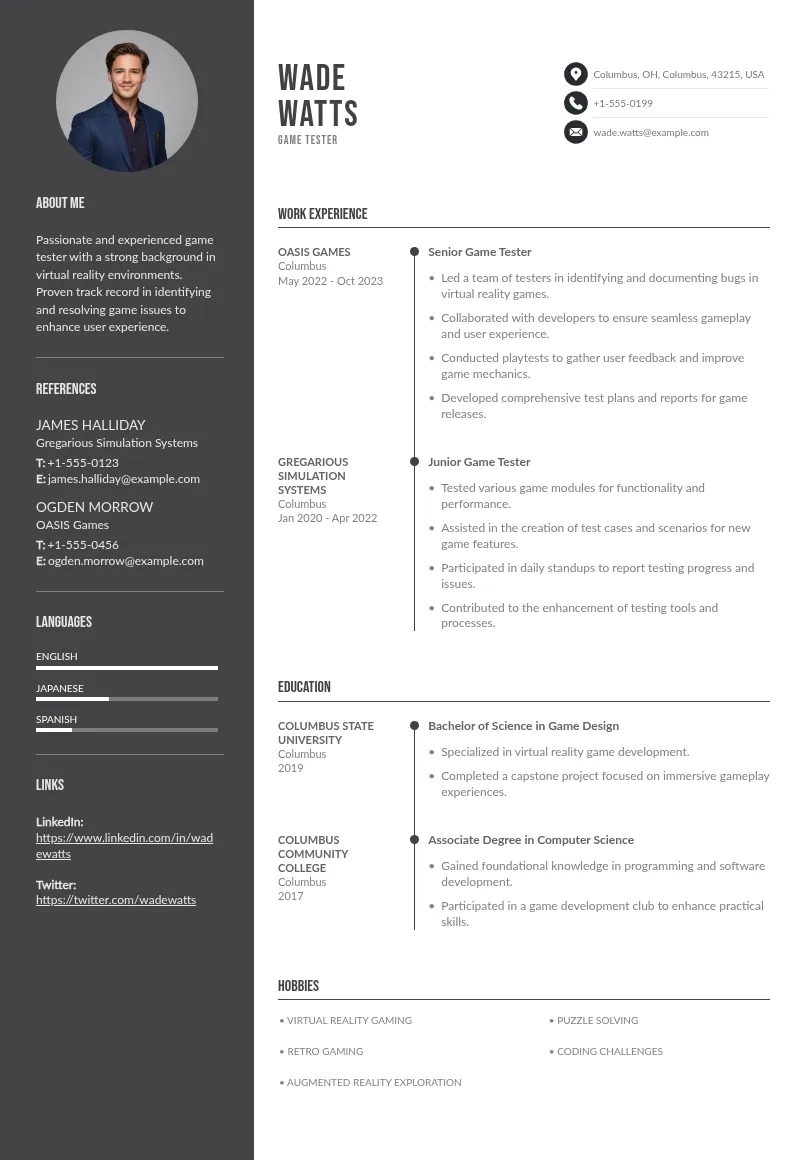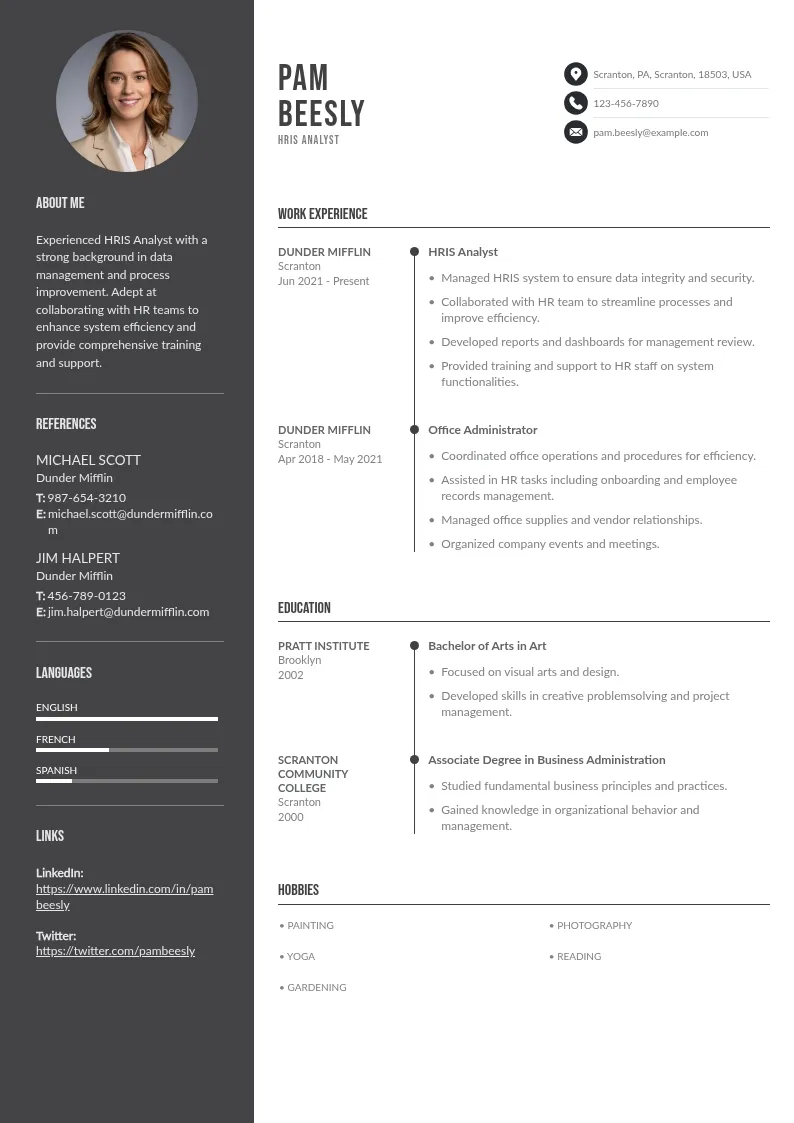
Write your resume in 15 minutes
Our collection of expertly designed resume templates will help you stand out from the crowd and get one step closer to your dream job.


Are you the person everyone turns to for comfort, organization, and creating harmony? If so, you might be an ESFJ. Known for their warmth, dependability, and strong sense of responsibility, ESFJs are the glue that holds groups together. They excel at managing tasks and people with an empathetic touch, ensuring everyone feels valued and included. But finding the right career can make all the difference for an ESFJ.
In this article, we look at the following key points:
- Key Traits of ESFJ the Personality Type
- Best Careers for ESFJs Skills for Success
- Careers to Avoid for ESFJs
- Work Environment Preferences for ESFJs
- How to Work Through Workplace Challenges as an ESFJ
- Frequently Asked Questions About ESFJ Jobs and Career Matches

Key Traits of the ESFJ Personality Type
Highly Organized and Reliable:
ESFJs are the planners of the group. They are always on top of schedules, deadlines, and details. Their dependable nature makes them indispensable in any team setting.
Highly Caring and Empathetic:
ESFJs really have a deep concern for the well-being of others. They naturally gravitate toward roles that allow them to support and care for people, and guide and nurture them. They’re often the first to notice when someone needs help, and are quick to offer assistance.
Harmony Seekers:
ESFJs value peace, as well as stability in their workplace environment. They excel in roles where they can foster cooperation, and ensure everyone is working together harmoniously.
Goal-Oriented:
Driven by a strong sense of duty and responsibility, ESFJs are motivated to set goals and achieve them. Both for themselves and for the teams they lead or support.
Best Careers for ESFJ Personality Types

1. Education
ESFJs thrive in educational roles thanks to their nurturing and organized nature. Their ability to connect with others and foster a sense of community makes them effective in various educational positions:
- School Teacher
- Special Education Teacher
- Educational Administrator
- Counselor

2. Healthcare and Wellness
Healthcare careers are well-suited for ESFJs due to their empathy and organizational skills. They excel in roles that involve direct patient care and managing patient services:
- Nurse
- Family Therapist
- Surgeon
- Healthcare Administrator
- Occupational Therapist
- Fitness Trainer

3. Administrative and Support Roles
ESFJs’ strong organizational skills and attention to detail make them ideal for administrative and support positions. They excel at ensuring smooth operations and providing essential support:
- Office Manager
- Executive Assistant
- Human Resources Specialist
- Business Administration Specialist

4. Entrepreneurial Ventures
For ESFJs with a leadership inclination, entrepreneurial ventures offer a rewarding path. Their ability to manage people and processes helps them succeed in business ownership and leadership roles:
- Business Owner
- Team Leader
Whether starting their own business, or leading a small team within a larger organization, ESFJs bring their natural leadership, and caring approach to create successful, people-centered ventures.
Career Development and Growth: Skills for Success
For ESFJs, career development is important. And growth hinge on leveraging their unique strengths. While continually expanding their skill set. Here’s how ESFJs can cultivate the skills needed for long-term success. And advancement in their careers:

1. Enhance Interpersonal Communication
Why It Matters:
ESFJs are naturally adept at connecting with others. But honing communication skills can elevate their ability to lead. And collaborate effectively.
How to Improve:
- Active Listening: Practice active listening. To understand others' needs and perspectives.
- Clear Expression: Work on articulating thoughts. And instructions clearly and empathetically.
- Feedback: Seek constructive feedback. To refine communication strategies. And adapt to different audiences.
2. Strengthen Organizational Abilities
Why It Matters:
Strong organizational skills are crucial for managing tasks. As well as projects, and teams efficiently.
How to Improve:
- Time Management: Utilize tools and techniques. For effective time management and prioritization.
- Project Management: Consider formal training. Or certification in project management methodologies.
- Process Optimization: Regularly review and streamline processes. To enhance efficiency and productivity.
3. Develop Leadership Skills
Why It Matters:
Leadership skills enable ESFJs to guide teams. And foster collaboration, and drive positive change within their organizations.
How to Improve:
- Leadership Training: Attend workshops or seminars. Focused on leadership and management.
- Mentorship: Seek out mentorship opportunities. To gain insights and advice from experienced leaders.
- Team Building: Engage in activities that build team cohesion. And strengthen relationships among team members.

4. Cultivate Problem-Solving Abilities
Why It Matters:
Effective problem-solving is essential for addressing challenges. And making informed decisions.
How to Improve:
- Critical Thinking: Practice critical thinking exercises. To enhance problem-solving skills.
- Scenario Analysis: Analyze potential scenarios. And outcomes to better prepare for various challenges.
- Innovation: Encourage creative thinking. And innovation to find novel solutions to problems.
5. Pursue Professional Development
Why It Matters:
Ongoing professional development ensures that ESFJs stay really current with industry trends. And enhance their expertise.
How to Improve:
- Certifications and Courses: Enroll in relevant certifications. And workshops, or courses to build new skills and knowledge.
- Networking: Join professional organizations. And attend industry events to expand your network and stay informed about industry developments.
- Continual Learning: Adopt a mindset of continual learning. And self-improvement to adapt to changing work environments and career demands.
6. Foster Emotional Intelligence
Why It Matters:
Emotional intelligence helps ESFJs manage their own emotions. And understand the emotions of others, leading to better interpersonal interactions and decision-making.
How to Improve:
- Self-Reflection: Engage in self-reflection. To understand your emotional responses and improve self-awareness.
- Empathy Practice: Practice empathy by actively considering others’ feelings. And perspectives.
- Stress Management: Develop techniques for managing stress. And maintaining emotional balance in challenging situations.
Careers to Avoid for ESFJs
ESFJs should steer clear of careers that involve sudden changes, isolation, or intense analytical thinking. They should also avoid roles with high risk or uncertainty, as these can lead to undue stress and anxiety.
It’s important for ESFJs to remain open to new challenges and opportunities for growth, but they should avoid getting trapped in unfulfilling or misaligned roles.

1. Roles with Minimal Social Interaction
Why to Avoid:
ESFJs thrive on interaction and teamwork. Jobs that require long periods of solitary work can lead to dissatisfaction and a lack of motivation.
Examples:
2. High-Stress or High-Conflict Jobs
Why to Avoid:
ESFJs prefer stable work environments and harmony. Careers characterized by constant stress or conflict can be overwhelming and counterproductive to their well-being.
Examples:
3. Careers with Heavy Bureaucracy
Why to Avoid:
ESFJs value efficiency and clear processes. Roles entangled in bureaucracy and red tape can be frustrating and impede their ability to make a meaningful impact.
Examples:

4. Unstructured or Highly Independent Roles
Why to Avoid:
ESFJs excel in structured environments with clearly defined roles and expectations. Jobs that lack structure or require high independence can lead to confusion and reduced job satisfaction.
Examples:
5. Positions Requiring Extensive Travel
Why to Avoid:
ESFJs often value stability and a supportive environment. Jobs involving extensive travel or frequent location changes can disrupt their need for consistency and connection.
Examples:
6. Roles Demanding High Levels of Competition
Why to Avoid:
ESFJs are more comfortable in collaborative settings rather than highly competitive or cutthroat environments. Jobs where competition is a primary focus can be stressful and misaligned with their cooperative nature.
Examples:
By steering clear of these careers and focusing on roles that leverage their natural strengths and preferences, ESFJs can actually find more satisfying jobs. And, ultimately, successful career paths.
Work Environment Preferences for ESFJs
ESFJs excel in work environments that offer structure, support, and a strong sense of teamwork. They thrive in settings where everything is clearly defined; Where roles, responsibilities, and expectations are laid out in detail. This clarity allows ESFJs to organize their tasks effectively, ensuring that everyone knows what to do and when to do it.
Collaboration is another key factor in an ESFJ’s ideal work setting. They are naturally inclined to work with others and find satisfaction in being part of a team. Whether it’s a small group project or a large departmental task, ESFJs are happiest when they can contribute to a collective effort.

Communication is also vital for ESFJs. They prefer workplaces where information flows openly and clearly. Regular check-ins, clear instructions, and honest feedback help ESFJs stay on track and feel valued. They appreciate when their contributions are recognized and when there’s a positive dialogue among team members.
Lastly, ESFJs value personal connections at work. They enjoy getting to know their colleagues on a personal level and often seek out opportunities to build relationships. Whether it’s chatting during a break, participating in team-building activities, or simply offering a listening ear, ESFJs find fulfillment in forming strong, supportive bonds with their coworkers.
Want to find out more about your strengths and the best workplace environment for you? Check this article about strengths that can boost your confidence and make you stand out.
How to Work Through Workplace Challenges as an ESFJ
- Managing Conflict:
ESFJs often seek to maintain harmony, but conflicts are inevitable in any workplace. To navigate these situations, focus on active listening and empathizing with others' perspectives. Use your natural diplomatic skills to mediate disputes, striving to find solutions that satisfy all parties involved.
- Dealing with Change:
Sudden changes can be stressful for ESFJs who value stability. To adapt, try to reframe change as an opportunity for growth. Break down new challenges into manageable tasks and lean on your strong organizational skills to create a new sense of order.
- Managing Overcommitment
ESFJs are naturally inclined to help others, often leading to overcommitment. To manage this, it’s important to assess your workload regularly and practice saying no when necessary. Prioritize tasks that align with your strengths and goals, and don’t hesitate to seek assistance when needed.
This approach will help you maintain balance and ensure that your contributions remain effective without overwhelming yourself.
- Taking Criticism
As an ESFJ, you may find criticism challenging, especially if it disrupts the harmony you strive to maintain. To navigate criticism constructively, focus on the feedback rather than taking it personally. View it as an opportunity for improvement and growth. Ask clarifying questions to fully understand the feedback and how you can apply it.
This mindset will help you grow professionally while maintaining positive relationships with colleagues.
Your strong sense of responsibility may lead you to take on too much, risking burnout. It’s important to set boundaries and prioritize self-care. Delegate tasks when possible and ensure you have time to recharge, both at work and outside of it.
By understanding and addressing these challenges, ESFJs can maintain a positive work experience, allowing their natural talents to flourish in any professional setting.
If you are currently facing challenges in your workplace that you feel you cannot overcome, have a look at this guide with reasons and tips for leaving your existing job.

Conclusion
ESFJs possess a unique set of skills and strengths that make them well-suited for careers in healthcare, education, and social work. They excel in roles such as public relations specialist, physical therapist, and positions that allow them to use their caring nature.
By understanding their personality type and considering their career interests, ESFJs can find fulfilling and rewarding careers that truly align with their values.
With the right skills and mindset, ESFJs can succeed in various careers and make a positive impact on the world.

















